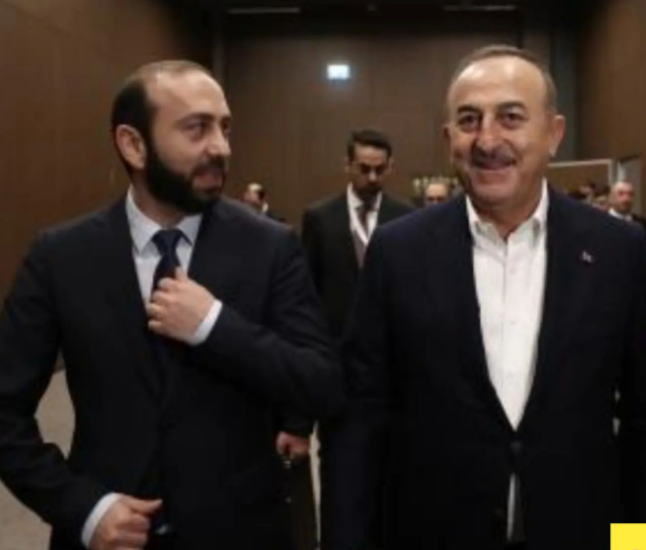Europe Desk, Delhi Magazine: Amid the earthquake, Turkey and Armenia declared their readiness for reconciliation. The Armenian Foreign Minister visited Ankara, where he met with his Turkish counterpart and Armenian rescuers working in Turkey. The parties announced their desire to normalize relations, but experts do not expect a breakthrough.
On February 15, Armenian Foreign Minister Ararat Mirzoyan arrived in Ankara and met with his Turkish counterpart Mevlut Cavusoglu. The visit took place ten days after the earthquake, which led to serious destruction and many victims in Turkey and Syria (by the evening of February 14, the total death toll was estimated at 41 thousand people). The disaster was the reason for Mirzoyan’s trip to the Turkish capital – after the negotiations, his schedule included a meeting with the Armenian rescue group, which is working in the affected Adiyaman in southeastern Turkey.
This is the second visit of the Armenian Foreign Minister to Turkey since March last year, although there are no diplomatic relations between the countries, and the border between them has been closed since 1993.
Mirzoyan expressed condolences to the people and government of Turkey in Ankara. “Today, we are not alien to the grief that has befallen thousands of families in Turkey. Such natural disasters and their scale go beyond the borders of states, turning into universal tragedies. The world must act as a united front to overcome them,” the minister said (quoted by the Armenian News.am agency ). He called it symbolic that the border, closed for 30 years, opened up for Armenian trucks with humanitarian aid for Turkey, and stated that Armenia is striving “for the complete settlement of relations with Turkey, the establishment of diplomatic relations and the full opening of the border.”
“Today we discussed some details regarding this process, we have an agreement on the joint repair of the Ani Bridge (located on the Armenian-Turkish border, connected the banks of the Akhuryan River. – RBC), as well as the intention to take care of the relevant infrastructure on the eve of the full opening of the border ” Mirzoyan said.
Cavusoglu confirmed that the parties agreed to “accelerate measures to normalize relations.”
Yerevan offered its assistance to Ankara on February 7, the day after the earthquake; with the same proposal he turned to Damascus. Detachments of Armenian rescuers went to both countries.
Cavusoglu thanked his Armenian counterpart for his help, noting that Armenia expressed solidarity and extended the hand of friendship to the people of Turkey. “28 rescuers arrived in the disaster zone from Armenia. Starting from February 8, they worked with dedication and saved a little girl and a young man in Adiyaman,” the minister said (quoted by the Turkish news agency Anadolu ). Also, five trucks with 100 tons of humanitarian aid arrived in Adiyaman from Armenia, for this the parties had to unblock the border, which had been closed since 1993. Yerevan sent 55 tons of such aid to Syria.
Cavusoglu recalled that when a devastating earthquake occurred in the area of the Turkish city of Izmit south of Istanbul in 1999, Yerevan also sent humanitarian aid to Turkey, and when Armenia suffered from an earthquake in the city of Spitak in 1988, Ankara transferred its assistance through the Alijan checkpoint . “And it was through this border that Armenia sent its aid to Turkey a few days ago,” the minister said.
Will the dynamics of negotiations change?
Turkey was one of the first to recognize the independence of Armenia, proclaimed in 1991. According to the website of the Turkish Foreign Ministry, Ankara made efforts to integrate the new neighboring state into regional organizations, the international community and Western institutions, but “the establishment of diplomatic relations was prevented by the war in Karabakh, which began with the attack of Armenia on Azerbaijan.” “After the occupation of Kelbajar, a region of Azerbaijan, in 1993, Turkey closed its border with Armenia,” the ministry’s website says. The Armenian Foreign Ministry on the website only states that in 1993 Ankara “unilaterally closed the air and land borders” and that two years later “the air border was reopened.”
The dialogue between Armenia and Turkey is complicated by the problem of recognizing the Armenian Genocide in the Ottoman Empire in 1915. It was recognized by most countries of Eurasia, including Russia, North and South America. Turkey denies the genocide. In the certificates of the foreign ministries of the two countries about their relations, this topic is not mentioned.
The first attempt to normalize relations between Yerevan and Ankara was made in 2008. A year later, in Zurich, the foreign ministers signed protocols on the establishment of diplomatic relations and their development. But in 2010, the process was suspended (in Yerevan they say that Turkey did not ratify the protocols in due time, in Ankara – that the Armenian Constitutional Court, considering these documents, put forward conditions that contradict the spirit of the protocols). In 2015, the President of Armenia withdrew the protocols from the National Assembly, and in 2018 the procedure was finally stopped.
The parties made another attempt to normalize relations in 2021. For this, special representatives were appointed: Ruben Rubinyan from the Armenian side and Serdar Kilych from the Turkish side. In 2022, they held four meetings: one in Moscow and three more in Vienna. In February 2022, direct flights between the countries resumed, they also agreed to open the border for the movement of citizens from third countries and resume air cargo transportation.

